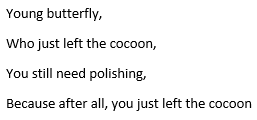A few years ago, a former social work student who had started working in Child Protective Services in NYC reached out to ask me how she should deal with Imposter Syndrome.
I hadn’t heard of this before. “What are you talking about?” I wrote back (I usually respond with perfect punctuation).
She sent me this:

I asked her what she was feeling inadequate about.
She responded that she struggled getting through to difficult parents and that she was afraid she couldn’t protect all the kids on her caseload. She told me of a recent situation where she had recommended the removal of a kid from a home and her supervisor blocked it.
I told her that it is often really hard to reach people, and that parents involved in child protective cases can be quite resistant, whether they are abusive or not or negligent or not. Because no one likes having someone else come into their life, poking around and making suggestions for improvement with the threat of losing their kids hanging over them. No one. I reminded her that she took a very tough job that has a high turnover rate because of the stress and quick burn out. And that any good child protection worker would worry about the things she was worried about.
For centuries, people learned their trade or job through an apprenticeship. In the Middle Ages, painters, sculptors, blacksmiths, cobblers, tailors, bakers and other aspiring professionals worked under an expert for a period of about seven years. They watched and learned and practiced and honed their craft. A number of renaissance artists had apprentices and it has been a challenge for all but those with the keenest eyes to figure out what painting was made by Rembrandt and what was created by an apprentice.
21st century society no longer allows for a seven year training period (not even for doctors). We are too rushed and living is too costly. So people get a quick education, often a shitty internship, and then they are hired into a job with a bad boss or poor supervisor and thrown in the deep end of the pool and left to figure it out.
There are terms for new people: rookie, private, freshman, beginner, fng (fucking new guy), cub, novice, newcomer, trainee, first-year, adept, initiate and tenderfoot. There are a bunch of others.
Those names exist for a reason. I thought about that conversation a few months later when I saw that a first term US Congresswoman tweeted that she struggles with “the imposter syndrome.”
Being new doesn’t mean you are an imposter. It means you are new. And that there is a lot of stuff you don’t know. And it takes time to learn. And the best way to learn is to watch and copy and ask questions of someone who is a little bit ahead of you.
If you are in a great school because your celebrity parents paid for a coach to lie and say you were great at swimming, you are an imposter. If you are an executive at a real estate company because your Dad owns it, you are probably an imposter.
If you are a first year nurse or a new school social worker or a rookie cop, you aren’t an imposter. You are just new.
With rare exceptions like Kevin Maas, Tyreke Evans, The Killers, and Ryan Gosling, most people don’t peak in their first year. If you are in the first year or two of a career or new position, it is probably going to be a bit of a challenge and you will sometimes doubt yourself and occasionally be overwhelmed. This is natural and proper and expected.
When I was in my early 20s, I wrote a poem to myself:

Most of us need polishing. Because we are new, not imposters.
If you still need a bit more reassurance (or are someone who has been in your job a long time and still feel like a fraud), go over these questions with a friend or family member or colleague or therapist or someone else that you trust (and can hear):
- Did I prepare for my job/position/career with a formal academic education or trade school?
- Did I fully apply myself in that education?
- Did I have an internship or apprenticeship or formal training period?
- Did I have a supervisor or mentor or trainer who met with me regularly and whom I asked a lot of questions?
- Did I lie or cheat or have sex or pay money to get this position?
- Am I still being trained or supervised now? If so, is my boss helping my development? If not, can I find someone to help polish me a bit more?
- Do I consult or chat with other people in my line of work?
- Have I read about other people’s experiences in this field? If not, will I?
- Do I show up early and/or stay late?
- Am I trying my hardest?
Someone told me recently that Imposter Syndrome was burning up on various social media platforms and people were claiming to have it and that it should be a diagnosis. No and no. Look, ask Google for directions or Alexa how to scramble eggs or Siri who wrote The Guns of August or Facebook for the best Pink Floyd Album, but don’t ask them or other social media to help you pick a romantic partner or figure out if you are doing a good job at work.
Everyone could benefit from a mentor, regardless of whatever stage of work or life you are in.
Back to my former student: she’s kicking ass in her job and is now helping new social workers get acclimated at CPS. I’ll end this with some recent words of wisdom from her, which can sum it up better than I could:
“You were right. I was just new.”